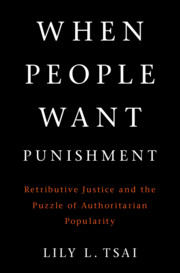Book contents
- When People Want Punishment
- Cambridge Studies in Comparative Politics
- When People Want Punishment
- Copyright page
- Dedication
- Contents
- Figures
- Tables
- Acknowledgments
- 1 The Puzzle of Authoritarian Popularity
- 2 A Retributive Justice Model of Citizen Engagement
- 3 Retributive Justice and State Production of Moral Order
- 4 Evaluating the Impact of Retributive Justice on Citizen Evaluations of Government Authorities in Rural China
- 5 Retributive Justice and Citizen Engagement in Rural China and Beyond
- 6 Democratic Dissatisfaction, Punitive Populism, and the Rise of the “Benevolent” Dictator
- Bibliography
- Index
- Other Books in the Series (continued from page iii)
3 - Retributive Justice and State Production of Moral Order
Published online by Cambridge University Press: 04 August 2021
- When People Want Punishment
- Cambridge Studies in Comparative Politics
- When People Want Punishment
- Copyright page
- Dedication
- Contents
- Figures
- Tables
- Acknowledgments
- 1 The Puzzle of Authoritarian Popularity
- 2 A Retributive Justice Model of Citizen Engagement
- 3 Retributive Justice and State Production of Moral Order
- 4 Evaluating the Impact of Retributive Justice on Citizen Evaluations of Government Authorities in Rural China
- 5 Retributive Justice and Citizen Engagement in Rural China and Beyond
- 6 Democratic Dissatisfaction, Punitive Populism, and the Rise of the “Benevolent” Dictator
- Bibliography
- Index
- Other Books in the Series (continued from page iii)
Summary
Chapter 3 illustrates the importance of retributive justice from the perspective of the state. Using the case of China, the chapter shows how leaders behave as if addressing the public’s concerns about retributive justice are important for their ability to maintain power. In fact, rulers may even foster such concerns in order to experience the bump in public support that comes from subsequently taking action to alleviate those concerns. In tracing the historical evolution of state strategies for retributive justice, we can see how state building involves not just resource extraction and the accumulation of coercive power but also the production of moral order. In China, government authorities and the public throughout the imperial and communist periods have consistently highlighted that retributive justice is and should be a core function of the state. Indeed, government authorities have at times taken active steps to encourage public outrage at the corruption and malfeasance of local state agents in order to then benefit from the implementation of retributive justice.
- Type
- Chapter
- Information
- When People Want PunishmentRetributive Justice and the Puzzle of Authoritarian Popularity, pp. 72 - 102Publisher: Cambridge University PressPrint publication year: 2021

